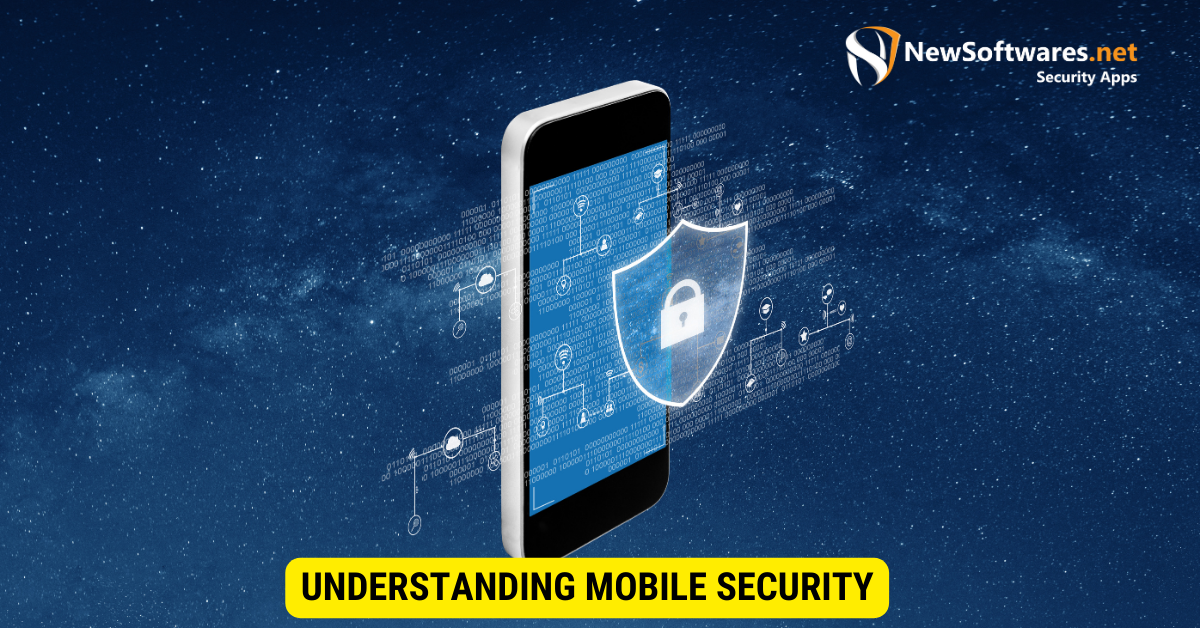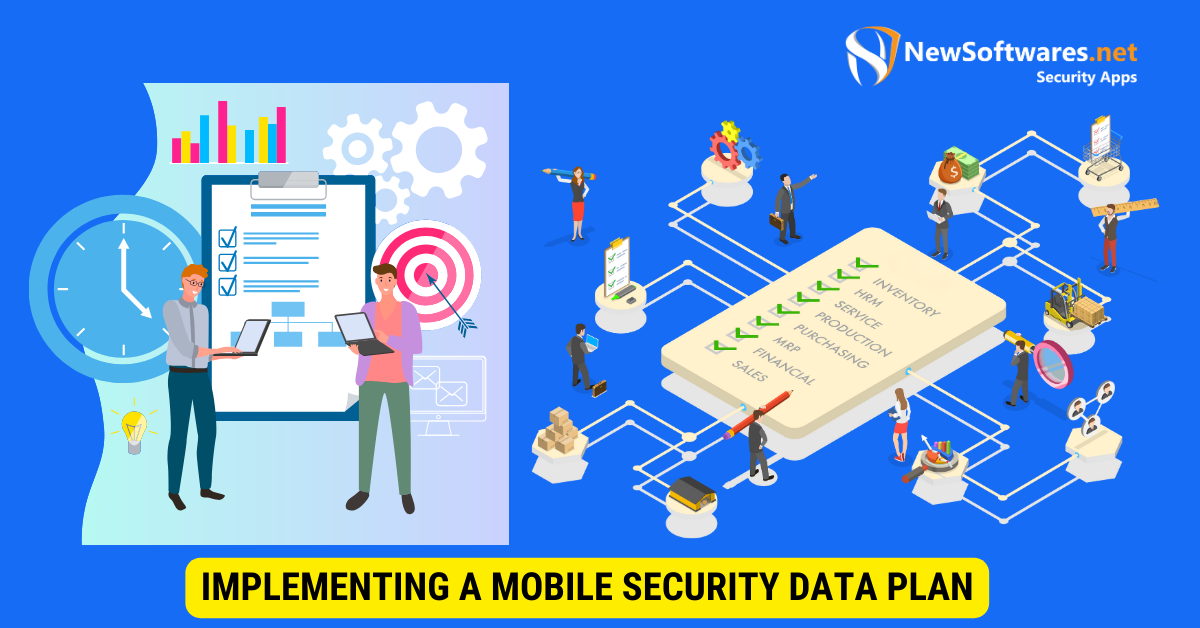A mobile security data plan is a service provided by mobile carriers to safeguard user data, protect against threats, and ensure the privacy and security of the user’s mobile device while accessing the internet.
Mobile security has become a vital aspect of our lives in today’s digital age. As our reliance on smartphones and mobile devices grows, so does the need for protection against evolving cyber threats. This is where a mobile security data plan comes into play. I will explore the various aspects of mobile security data plans, including their importance, key features, and how they can be combined with data plans for a comprehensive mobile experience.
Understanding Mobile Security

Mobile security is a dangerous aspect of our digital lives, especially when safeguarding personal and sensitive information reserved on our smartphones. In today’s fast-paced world, where the use of mobile devices has become ubiquitous, it is essential to be aware of the potential risks and take necessary precautions to protect ourselves.
The Importance of Mobile Security
With the exponential growth of apps and mobile internet usage, our devices have become attractive targets for hackers and cybercriminals. These malicious actors constantly seek vulnerabilities in mobile operating systems and request to gain unauthorized access to our data. Therefore, having a robust mobile security data plan is crucial to safeguard the safety and privacy of our information.
A mobile security data plan provides various measures to protect against malware, viruses, phishing attempts, and other threats. It acts as a shield, constantly monitoring and analyzing incoming data to identify and block potentially harmful elements. Doing so ensures that our data remains secure, preventing unauthorized access and potential data breaches.
Key Features of Mobile Security
A comprehensive mobile security data plan offers many features to ensure thorough protection. These features work together to create a multi-layered defense system, making it difficult for cybercriminals to breach our devices and access sensitive information.
One of the key features of mobile security is real-time antivirus scanning. This feature continuously scans our device for malicious software or viruses, promptly detecting and removing them before they can cause harm. It acts as a vigilant guard, constantly monitoring our device’s files, applications, and network connections to ensure their integrity.
In addition to antivirus scanning, mobile security data plans often include web protection. This feature safeguards us from visiting malicious websites that may attempt to steal our personal information or infect our devices with malware. It analyzes website URLs in real time, blocking access to potentially harmful sites and providing a safe browsing experience.
Another important feature is app scanning for vulnerabilities. Mobile security data plans assess the applications installed on our devices, identifying any potential weaknesses or security flaws. By doing so, they help us stay ahead of cyber threats by alerting us to any vulnerabilities in the apps we use. This allows us to take appropriate action to mitigate potential risks, such as updating or uninstalling vulnerable applications.
Secure browsing is yet another significant feature provided by mobile security data plans. It encrypts our internet traffic, ensuring our online activities remain private and protected from prying eyes. This feature is particularly crucial when using public Wi-Fi networks, which are frequently targeted by hackers seeking to intercept sensitive information.
Anti-theft measures are also commonly included in mobile security data plans. These measures allow us to remotely locate, lock, or wipe our devices in case they are lost or stolen. By enabling these features, we can prevent unauthorized access to our data and ensure that our personal information remains secure even if our device falls into the wrong hands.
By combining these key features, mobile security data plans provide a comprehensive defense against potential threats. They work tirelessly in the background, safeguarding our devices and data allowing us to use our smartphones with peace of mind.
The Basics of a Data Plan
A data plan is a subscription-based service provided by mobile network operators that allows users to access data networks for internet connectivity. It is essential for browsing the web and using apps, videos, streaming content, and other online activities.
Having a data plan is crucial when it comes to accessing the internet and using various online services on our smartphones. Without a data plan, we could not attach to the internet and enjoy the benefits of the digital world.
Data plans come in various types to cater to different needs and usage patterns. One common type is the limited data plan, which offers a specific amount of data for a fixed price. This type of plan is suitable for individuals with moderate internet usage and does not require unlimited data.
On the other hand, unlimited data plans provide users with unlimited access to data networks. These plans are ideal for weighty internet users who rely on their smartphones for various online actions such as streaming movies, playing online games, and downloading large files.
Prepaid data plans are another type that allows users to pay in advance for a specific amount of data. This type of plan is popular among individuals who want to control their data usage and avoid unexpected charges.
Shared data plans are designed for families or groups who want to share a data pool among multiple devices. With a shared data plan, users can allocate a certain amount of data to each device, ensuring everyone has internet access without exceeding the data limit.
Choosing the right data plan is essential to ensure that you have sufficient data for your needs without overspending. When selecting a data plan, it is important to consider factors such as your internet usage, the number of devices you want to connect, and your budget.
In conclusion, data plans are vital to our digital lives, allowing us to access the internet and enjoy various smartphone services. With different types of data plans available, choosing one that suits your specific requirements and usage patterns is important.
Combining Mobile Security and Data Plans
With the growing reliance on mobile devices for various tasks, robust mobile security solutions have become paramount. However, managing multiple mobile security and data service subscriptions can be a hassle. This is where the concept of combining mobile security and data plans comes into play, offering users a convenient and efficient solution.
Benefits of a Mobile Security Data Plan
By combining mobile security and data plans, users can enjoy several benefits. Firstly, it provides seamless integration, ensuring that your mobile security solution works hand in hand with your data plan. This integration allows for a more efficient and effective protection of your device and data, as both services are designed to complement each other.
Secondly, opting for a mobile security data plan offers cost-effectiveness. Many service providers offer bundled packages that include mobile security and data services at a discounted rate. You can enjoy peace of mind with robust mobile security without breaking the bank.
Lastly, a mobile security data plan simplifies management. You only need to rely on one provider instead of dealing with multiple providers for your mobile security and data needs. This streamlines managing your subscriptions, payments, and customer support, saving you time and effort.
Choosing the Right Mobile Security Data Plan
When selecting a mobile security data plan, it is important to consider your specific requirements. The level of protection offered should be a top priority. Look for structures such as real-time scanning, malware detection, and secure browsing to ensure comprehensive protection against potential threats.
Compatibility with your device is another crucial factor to consider. Ensure the mobile security solution is compatible with your operating system and device model to guarantee seamless integration and optimal performance.
In addition to the basic security features, it is worth exploring the additional features offered by different mobile security data plans. Some plans may include anti-theft protection, privacy safeguards, and parental controls, providing an all-in-one solution for your mobile security needs.
Customer support is another important consideration. Look for a provider that offers reliable and responsive customer support, as you may need assistance troubleshooting or resolving any issues.
Lastly, pricing plays a significant role in the decision-making process. Compare different mobile security data plans, taking into account the level of protection, additional features, and customer support offered. It is essential to balance affordability and the quality of service provided.
In conclusion, combining mobile security and data plans offers users a convenient and cost-effective solution. By considering factors such as the level of protection, compatibility, additional features, customer support, and pricing, you can make an informed decision and select the right mobile security data plan that meets your specific needs.
Implementing a Mobile Security Data Plan

Steps to Implement a Mobile Security Data Plan

Implementing a mobile security data plan involves a few key steps. Firstly, you must select a reputable provider offering a comprehensive mobile security solution. Next, choose a data plan that suits your needs and budget. Once you have both services, install the mobile security app on your device, follow the setup instructions, and activate it. Ensure you update your mobile security app to benefit from the latest security patches and enhancements.
Maintaining Your Mobile Security Data Plan
Maintaining a mobile security data plan requires regular attention to ensure its effectiveness. To keep your plan running smoothly, update your mobile security app regularly, as new threats emerge constantly. Be vigilant while downloading apps and browsing the web, and avoid suspicious websites or downloads. Regularly review your data usage and adjust your plan if needed, ensuring that you have sufficient data for both browsing and security measures.
Future of Mobile Security Data Plans
Emerging Trends in Mobile Security Data Plans
As technology advances, mobile security data plans are also expected to evolve. Some emerging trends include artificial intelligence-powered security solutions that detect and mitigate real-time threats. Additionally, advancements in encryption technologies and biometric authentication methods may enhance the security offered by these plans, ensuring greater protection for users.
The Role of Mobile Security Data Plans in Digital Transformation
In the digital transformation era, where businesses and individuals increasingly rely on mobile devices, mobile security data plans play a vital role. By providing comprehensive protection and data connectivity, these plans enable seamless integration between work and personal life, ensuring productivity, privacy, and peace of mind. As digital transformation continues to reshape industries, mobile security data plans will be integral to the process.
Key Takeaways
- Mobile security data plans protect against malicious software, phishing, and other online threats.
- They may offer encrypted connections for safer browsing.
- These plans often include antivirus and anti-malware tools.
- Users can protect sensitive data in case their device gets lost or stolen.
- A premium might be charged for advanced security features.
FAQs
Q: Do all carriers offer mobile security data plans?
A: Not all carriers offer them, but many major carriers have options for added security features.
Q: Is a mobile security data plan the same as a VPN?
A: While some plans may offer VPN services, they can also include other security features.
Q: Can I install my security software on top of my plan?
A: Yes, but ensure compatibility and avoid redundant functionalities.
Q: How do I know if my plan is active and working?
A: Carriers usually provide a dashboard or app where you can monitor the security status.
Q: Are mobile security data plans foolproof?
A: No security measure is 100% foolproof. It’s essential to combine these plans with safe browsing practices.
Conclusion
In conclusion, a mobile security data plan is essential in today’s mobile landscape. It combines the protection provided by mobile security solutions with data connectivity, offering a comprehensive and secure mobile experience. By understanding these plans’ importance, key features, and benefits, users can make informed decisions when choosing and implementing a mobile security data plan. As technology progresses, these plans will continue to evolve, playing a crucial role in business’s and individuals’ digital transformation
